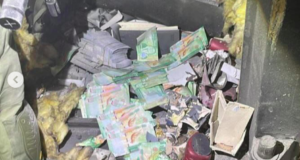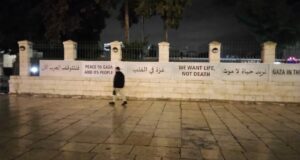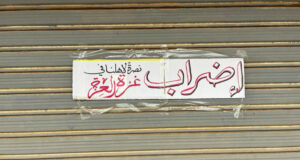by -bat.
Internationals in the west bank are busy – there is a lot of useful things to be done, and operating to a tight schedule is not easy in a world where unexpected restrictions may be imposed without warning, and a simple half hour journey can suddenly turn into four due to being detained at a checkpoint. By the time we were at Bil’in Katie had already traveled down to Hebron where she teaches art classes to children during the day, and I watched Martinez take a phone call from Al Jazeera lying flat to the ground sheltering behind a wall as the rest of us ran from the soldiers. The plan had been to travel down together later that day, but things finished so late with so much work left to do in the press office that he simply did not have time. He was already on another interview with the press as I left to find my way south. Busy people.
Catching a cab, Palestine style
I take a walk up to the centre of town. The economy of the west bank may be in ruins, but still the centre of Ramallah is bustling with people. It’s a lively place, and a casual glance wouldn’t show that you were anywhere unusual. There are cafes, and shops and people going about their daily lives as they would anywhere. Jeans, trainers and t-shirts are the seem to be the predominant dress code just as they are here in the UK, and it’s a typical street scene. The normality of large chunks of everyday life somehow just highlight the abnormality which you keep running up against. I don’t know what I imagined, but people browsing the latest DVD’s and shopping for cosmetics probably wasn’t it. It’s a glimpse of the way things would be if this was a normal independent country and I was here as a normal tourist.
The market area is where I am aiming for in order to catch what is known as a “service taxi”. These things are a wonderful idea, and make the whole process of moving about the country cheap and easy. The basic concept is to take the taxi idea and turn it on it’s head. Instead of finding a taxi and telling the driver where you are going, a service taxi is one which already knows where it is going and sets about soliciting passengers for that destination. You find a driver going to the place you want, agree the price (fixed for a given destination) and you get in. When the vehicle is full it leaves. My arabic is zero, and I cannot read the script, but by simply smiling and saying “Service Al Khalil?” (the arabic name for Hebron) to various drivers I soon find myself sitting in the back of a car awaiting other passengers.
Is crossing the occupied territories on your own speaking not a word of the language difficult? I’ve had more trouble getting back from south London after a night out!
The barrier and other decorative landscape features
We head down to Qalandia – I have not seen it in daylight before, but the presence of sunshine does not make it any less ugly. The wall is grey and grim, with our side covered in protest graffiti, including a Banksy. Strange to see something so familiar from London in this place. We take a left and skirt round the city tracking the line of the wall. I spend some time trying to work out how they decide which parts are to be the huge concrete prefabricated structures and which are to be the high fence. The change between the two does not seem to match built up areas on the far side. I am alter told that eventually it will be all concrete. Along the way we pass an Israeli army base on the inside of the wall, containing a compound filled with the infamous armored bulldozers and I can’t help thinking of Rachel Corrie.
This is, by any standards, a beautiful country. Blue skies, and rolling hills covered with terracing for olive groves and punctuated by small towns. If it wern’t for the latter then it would look somewhat like Greece, but the distinctive flat-roofed architecture is a dead giveaway that you are in the middle east. A direct drive from Ramallah to Hebron would be a short trip down to Jerusalem, and then south through the countryside. But this is, of course, not possible. The barrier encircles the Palestinian part of Jerusalem, “reuniting” the city, and cutting off a large chunk of land to the east. So all the traffic between the two halves of the west back must detour round it on a single route, passing through Container checkpoint. Although this area is completely Palestinian, the Israeli’s block the road here and check vehicles driving through, despite the fact that this is not checking anyone passing into, or out of, Israeli territory. It does, however, act as an effective throttle to communications between the two halves of the country.
We leave the barrier behind us and head deeper into the countryside. Even out here though you are never free of evidence of the occupation, most obviously from the block-like structures of the settlements which squat on the hilltops. There is an entire separate network of roads out here linking these, on which the Palestinians are forbidden to drive, and we pass under what I take to be one such road, a large well maintained highway on a bridge with a fence, unconnected to the narrow road we are using. To either side you can see where olive groves have been chopped down and trees burnt, and at one point we pass the densely packed concrete temporary structures of a refugee camp. They have been temporary for a very long time.
Riding in cars, with locals
All the previous service taxi’s I had taken were of the form of a people-mover style vehicle holding about eight passengers. Today’s, however, is simply a standard private car, and I find myself perched on the hump in the centre of the back seat, between two solidly built gentlemen and with an excellent view out of the front windscreen. This viewing position is not for the faint hearted given the enthusiastic traffic dodging that driver engages in, particularly as we descend the hillside beyond Container. Here the road drops away into the valley to one side, and I am very aware of our proximity to the edge as we speed down the wrong side of the road into the path of oncoming vehicles.
Only one of my fellow passengers speaks any english, the one in the front seat and he turns round to engage me in conversation at various points. We discuss London, the difficulty of getting permits for Palestinians to travel abroad, and he asks whether I went to University. I tell him about York and he tells me that he also went to University and has a degree in political science. I ask if he got that in Palestine.
“No” he replies, “Baghdad University”.
Errr, O.K. So lets ask the obvious question “When were you there?”
“1992. During the time of Saddam Hussein”. Then he grins at me and says.
“What do you think of Saddam Hussein? What is the opinion of him in your country? There was much less trouble in those days, yes ?”
Eeek! So much for avoiding tricky subjects! Actually I suspect I was being teased to a certain extent. He knows that I am unlikely to be particularly pro-Saddam, but also probably won’t want to start getting into a heated political disagreement on the subject in present company. So I opt for the diplomatic statement that there may have been less trouble, but that really doesn’t excuse what he did to the Kurds, and the conversation doesn’t go much further than that to my relief.
My conversational companion turns out to live in a small village outside Hebron, and we make a detour to drop him off. Past some small Israeli watchtowers, and eventually leave him beside a dirt track which has been roadblocked with concrete to prevent vehicles accessing it. He says he will walk from there, and then unexpectedly asks me to come with him! He wants me to come to his house, to meet his family and drink tea and talk. From his expression it is a genuine invite too. had it been earlier in the day I would have taken him up on it, but by this time it is sunset, and I need to meet up with Katie, so I have to say “no”.
Welcome to Hebron
It’s dark when I eventually get out of the car in the middle of Hebron. Again I have no map, but asking directions from a number of people I end up heading in the right direction, and have attracted a group of five or six children playing football. The children here always seem to find me fascinating, possibly due to the hair, and I kick the ball about with them briefly. They are, however, more interesting in asking me lots of questions about where I come from and what life is like in England.
This area is a fruit market during the day, but is now shut. A group of men are sitting round a fire drinking tea and listening to the radio. This is where I am supposed to loiter and wait for someone to collect me, but I don’t really get the opportunity. I am grabbed and propelled through into the middle of the group and sat down. Nobody here speaks english, and I try and explain that I have someone to see, but they won’t let me leave. Instead they start offering me fruit. I am wondering if they are trying to sell it to me, but they won’t take any coins for it. Explaining that I am unable to eat fruit is beyond me, and so I end up acquiring a banana and an apple, despite my protests. They are only being friendly I suppose, but their enthusiasm is somewhat intimidating, and I am rather relived when I am collected and can say goodbye.
Borders and birthdays
We head away from the market and up a dark street, to where I am confronted by what appears to be a portacabin wedged across the road, blocking it entirely. We get closer and it is indeed a portacabin. A sliding door opens and we go in – it is, of course, a checkpoint in miniature. Inside are two metal detectors, and behind a glass screen at the far end a soldier monitoring as we go through. Hebron is a city split in two, due to the presence of four settlements actually inside the city itself. Of which I shall write more tomorrow. This is the crossing point though, and under the watch of the guard we pass through the metal detectors. The road the far side is quiet and dark, with Israeli soldiers lurking at various points along it. They avoid catching our eye as we walk past them up the hill.
The ISM flat is a complete contrast, however, as it is Katie’s birthday and a surprise party has been arranged for her, complete with cake and balloons. I walk into the middle of this and am immediately called upon to sing. One quick round of “happy birthday” later (which everyone joins in on much to my relief) and I grab a juice and make myself comfortable. I did plan on bringing a present, but it is with the rest of my luggage still in the hands of El Al security. All I have is my free fruit, which seems a poor substitute somehow. It is a nice way to end a very intense day though, sitting drinking juice, eating cake and chatting with the others. Some normality is good, but I begin to realise that I am having trouble just processing the amount of stuff I have seen in the last 36 hours. I need to though, because I am sure there will be more in the morning.
Out here, there’s always more.
 International Solidarity Movement Nonviolence. Justice. Freedom.
International Solidarity Movement Nonviolence. Justice. Freedom.


